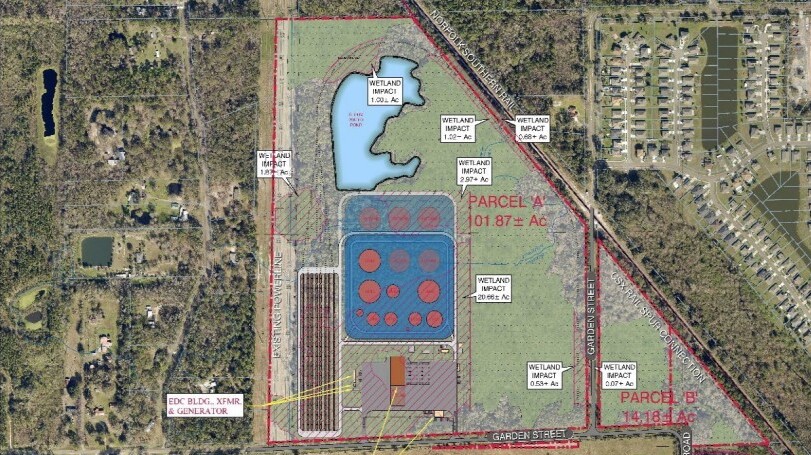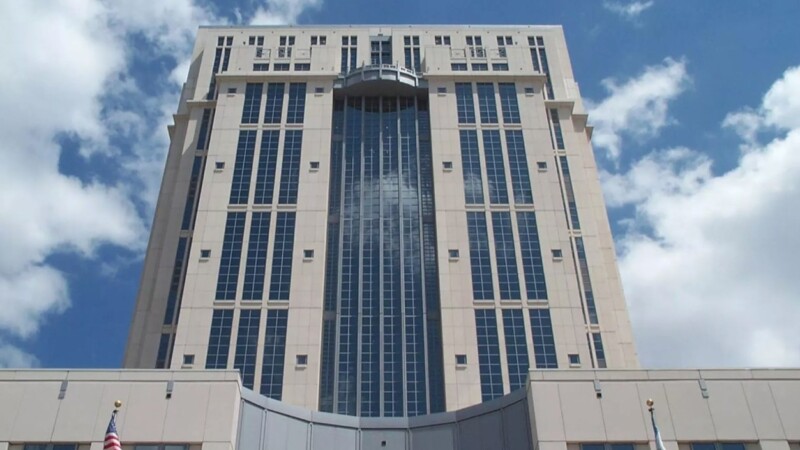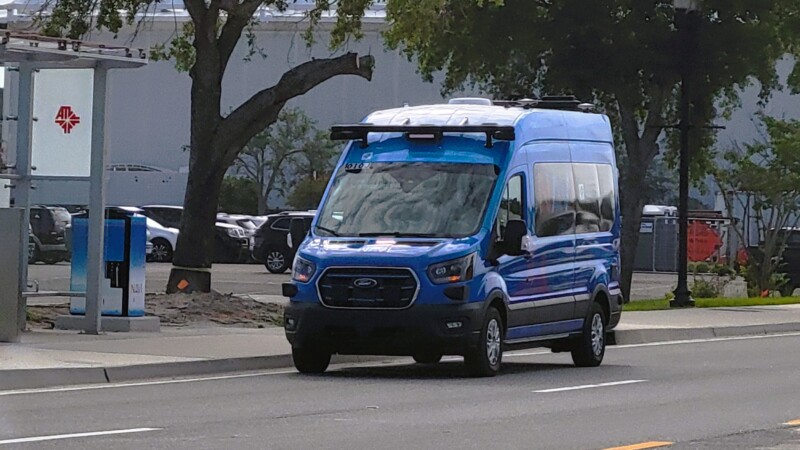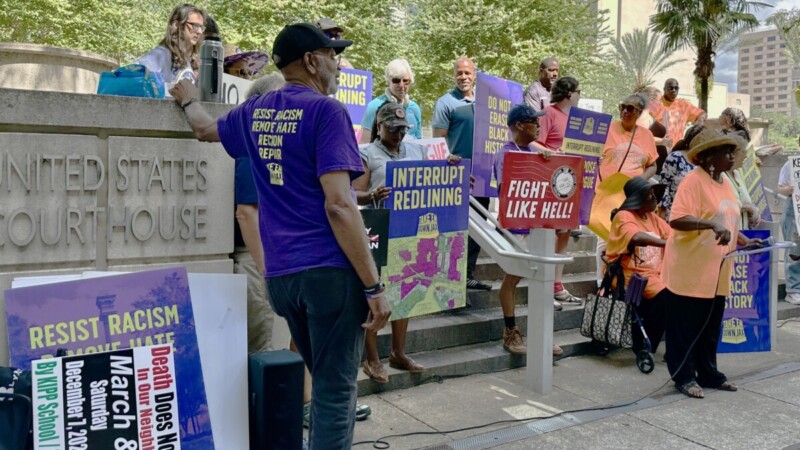Dinsmore residents breathed a collective sigh of relief this week as a developer withdrew a plan to place a 101-acre fuel storage facility and rail transport hub in their Northwest Jacksonville backyard.
But Belvedere Terminals’ grand plan for a fuel transport hub in the Jacksonville area isn’t dead — it’s likely just moving. And the search for a new site has zoning ramifications that could affect the way flammable liquids are stored countywide.
The outcome depends on which way the council goes on an appeal by the rail transport company of a land-use denial by the city’s planning director — Resolution 2024-0222 — that’s expected to be heard by the City Council this coming Tuesday.
How we got here
For much of the past year, Belvedere Terminals had been working to set up a site in Dinsmore with 14 aboveground fuel storage tanks, new railway construction and truck loading bays to transport various types of fuel across Florida. It was one of three sites the company was looking to build to make fuel transport more efficient across the state.
The company has said it expects to invest $100 million in Jacksonville alone and that the proposed hub system will offer Floridians “safer, lower cost and more reliable delivery of gasoline, diesel and jet fuel.”
Like at the Dinsmore site, a planned hub just north of Daytona Beach is meeting with intense resistance from residents and local government officials.
Early in Jacksonville’s Land Use and Zoning Committee meeting Tuesday — without much fanfare or discussion — attorney for Belvedere Terminals Jason Gabriel withdrew the company’s application for the proposed fuel farm on Garden Street between Imeson and Paxton roads. Residents who had been fighting the company’s choice of location showed up to witness the committee vote unanimously to accept the withdrawal.
But later that evening, Gabriel, a partner with Burr & Forman and former general counsel for the city of Jacksonville, approached the dais again to appeal a decision on the terminal project by the city’s new planning director.
At issue is whether bulk storage of flammable or explosive materials is permitted in the city’s “light industrial” zones. Gabriel and Belvedere Terminals say it is. Jacksonville Planning Director Brett James says it is not.
‘Inconsistencies’ in the law
James was appointed planning director by Mayor Donna Deegan earlier this year.
“I looked primarily at the land use code,” James told committee members at Tuesday’s meeting, recapping his written interpretation of Jacksonville’s land use law. “I looked at what (heavy industrial) said. I looked at what (light industrial) said, and H.I. clearly allows the storage of hazardous materials, including flammable and explosive materials. L.I. makes no reference to that.”
James and Gabriel agree that both land uses allow bulk storage, but James says light industrial cannot include anything hazardous.
“I think the subjective piece is giving thought to where we want these very large fuel depot-level bulk storage (facilities) located, and I don’t believe that L.I. is the right place,” James said.
According to the city, 654 parcels across Jacksonville are zoned heavy industrial — far fewer than the 3,539 light industrial sites.
According to the city, there have been more than 15 large gas tank fires in Jacksonville’s history. In 1993, a 2.3-million-gallon Steuart Petroleum gas tank fire killed one person and burned for 115 hours as fire fighters sprayed it with water pumped directly from the St. Johns River.
In an email to Jacksonville Today Thursday, mayor’s office spokesman Phil Perry said some “light industrial” parcels in the city could support such a large amount of gas storage, but Dinsmore is not one of them.
“The issue at hand here is the sheer quantity of gas — 15-20 million gallons in Phase 1 of the project — that would be stored near two housing complexes on one side and I-10 on the other, without a large body of water nearby. In the event of a large-scale fire, the nearby neighborhoods would need to be evacuated; I-10 would be shut down; and there wouldn’t be enough available water to fight the fire.”
Gabriel said at the LUZ meeting that Belvedere Terminals had submitted more applications, but efforts to reach Gabriel on Thursday to ask for details were unsuccessful.
Perry says as of Thursday evening, no new applications for an alternative site had been received by the city.
Past precedent
As Gabriel pointed out, the city has been allowing hazardous material storage in light industrial zones for years. According to him, if the City Council ultimately agrees with James that hazardous storage isn’t allowed, at least 44 businesses in Jacksonville will be violating the law. Those include the Buckeye Terminal on Zoo Parkway, Jacksonville Tank Farm on Stewart Avenue, Publix Supermarket Warehouse on Beaver Street and Paul Murray Oil on Florida Avenue.
“The list goes on,” Gabriel said. “So whatever decision is made will affect those sites as well.”
Gabriel argued that the planning director’s interpretation of the law would violate the Equal Protection Clause of the Constitution because it treats Belvedere Terminals differently than other businesses. He asked the committee to recommend approving Belvedere Terminals’ appeal, rejecting the planning director’s “faulty, erroneous interpretation.”
And it did, unanimously.
Land Use and Zoning Committee Chair Kevin Carrico put the board’s collective thoughts this way: “We shouldn’t punish this group over our own inconsistencies in our code. They’ve been working with the community. They’ve been diligent. … It’s not fair to punish them and block this investment because we don’t have our stuff together. So let’s get it together.”
But while everyone on the dais voted in favor of Belvedere Terminals, several council members agreed with James’ interpretation on hazardous-material storage in light industrial zones overall.
“Director James provided a reasonable and defendable interpretation of the city’s land use ordinance, which was supported by the Office of General Counsel,” Perry said. “Several LUZ committee members expressed their support for the interpretation but voted to honor decisions made by staff prior to Director James’ arrival in February.”
What’s next?
If the full City Council disagrees with the Land Use and Zoning Committee on Tuesday, at least 44 companies will be out of compliance, according to Gabriel.
If the City Council agrees, Senior Assistant General Counsel Jason Teal says, the city will likely need to enact a moratorium on applications while it patches up a gap in the land code “so somebody’s not going to be able to kind of slip into the gap.”
“If you allow this, by right, in (light industrial), then how many additional properties does that open up by right?” he said.
It is also possible that legal doctrine could support the “grandfathering-in” of properties that have been deemed legally non-conforming — those sites just would not be allowed to expand upon that use.
Regardless of Tuesday’s vote, the Deegan Administration says the rules have to sharpened.
“This issue highlights the need to clarify land use and zoning guidelines regarding hazardous materials to include those that are flammable and/or explosive,” Perry said. He says comprehensive plan changes require state approval, so there would be a six- to eight-month approval process for those, but there are other land-use code changes that could occur more quickly at the local level.
“Our ultimate goal is to ensure public safety while allowing businesses to succeed,” he says.
Updated: This story was updated on April 19 to clarify the time frame for land code and comprehensive plan changes.

Casmira Harrison is a Jacksonville Today reporter focusing on local government in Duval County.






